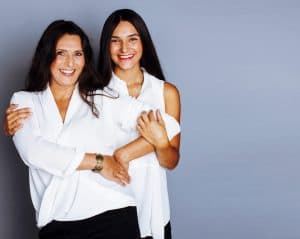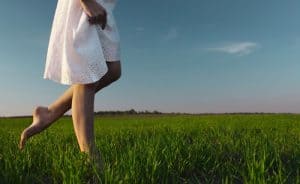Does genetics influence varicose veins?
Does genetics influence varicose veins? The short answer is “yes.” Having a family history of varicose veins is one of the biggest risk factors for developing them yourself. If, for instance, you’ve got one parent with varicose veins there’s about a 40% chance that you’ll be affected. If both of you parents have them your chances increase to approximately 80%.
The good news, however, is that genetics isn’t destiny. By making the right lifestyle choices it’s possible to dramatically lower these odds.
The hereditary connection.
As with many other conditions, genetics plays a large role in several types of vein disorders. Even so, the reasons why aren’t entirely clear and several genes appear to be involved. More research is necessary but it’s likely that the genes which influence vein wall formation play a large role. It’s also safe to say that mutations in the genes related to venous valves contribute as well. It’s also entirely possible for both sets of genes to be faulty simultaneously.
Most of what we know about our genetics comes from the human genome project—one of the largest scientific endeavors of the last century. Vast amounts of data were generated which geneticists are still deciphering to this day. In 2005, a hallmark study published in the journal Vascular Medicine detailed some of the genes which may be involved. Based on this research it was concluded that a single gene known as FOX C2 is probably the biggest contributor. This gene affects, among other things, how the internal and external vein walls are formed.
A proactive approach to prevention.
This isn’t to say that that genetics is the only factor at play, however. It’ll take some work, but with simple lifestyle choices it’s possible for many patients to avoid vein problems entirely.
Those with a family history of varicose veins can take the following steps:
- Eat a healthy diet. This plays a critical role in avoiding many chronic diseases, and varicose veins are no exception.
- Maintain a healthy body weight. Being overweight or obese puts added pressure on the large veins in the legs.
- Exercise regularly. This encourages healthy circulation. Exercises which work the calf muscles are particularly helpful.
- Avoid standing for long periods. If you’re regularly on your feet for hours on end it pays to take periodic breaks.
- Wear compression stockings. This is one of the single most effective methods of treating existing varicose veins. Doing so can also prevent others from forming.
- Limit alcohol consumption. It’s not clear why, but excessive alcohol consumption has been linked to an increased risk of vein disease.
You’ll notice that the above steps not only reduce the risk of developing vein disease but promote overall health as well. It’s also important to point out that genetics isn’t everything. By taking the proper steps even the strongest family history isn’t a guarantee that vein disease will occur.
Other Causes Of Varicose Veins
Now that you know that varicose veins and spider veins are caused by more than only their parents, you should learn about the additional causes of varicose veins and spider veins.
If you know what’s causing your illness, it’ll be much easier to obtain treatment and figure out why the problem keeps reappearing.
The following are the most common reasons for venous disease:
1. Being Overweight
Varicose veins are caused by pressure on the veins.
Excess body fat compresses vein walls, weakening the fragile valves that keep blood flowing from the extremities to the heart in overweight persons.
When the valves of a vein fail, blood can pool in the vein, straining, twisting, and expanding it until it becomes a varicose vein.
2. Aging
Varicose veins are prevalent and affect people of all ages; however, you are more likely to get them if you are over the age of 50! Especially if you are over fifty years old.
This occurs as our veins weaken with age and are frequently ripped or damaged.
Your veins will have a tougher time circulating blood throughout your body as a result of this damage.
Blood can sometimes gather in the middle of veins, causing blood to pool.
This blood pooling can cause veins to bulge, resulting in varicose veins.
3. Sex
The illness is more likely to affect women. Because female hormones tend to relax vein walls, hormonal changes before a menstrual cycle, during pregnancy, or during menopause could be a contributing factor. Varicose veins may become more common as a result of hormone therapies, such as birth control tablets.
4. Pregnancy
The body’s blood volume rises during pregnancy. This alteration helps the developing fetus but may also cause the veins in the legs to expand.
What To Do If Your Varicose Veins Are Genetic?
If you have varicose veins that are primarily caused by genetics, there are several steps you can take to manage the condition and alleviate symptoms:
- Consult with a healthcare professional
Visit a vein specialist or healthcare provider experienced in treating varicose veins. They can evaluate your condition, provide an accurate diagnosis, and recommend appropriate treatment options.
- Wear compression stockings
Compression stockings can help improve circulation in your legs and reduce the symptoms associated with varicose veins. They apply gentle pressure to the legs, promoting blood flow and minimizing swelling and discomfort.
- Maintain a healthy weight
Excess weight can put added pressure on your veins, exacerbating varicose veins. Maintaining a healthy weight through regular exercise and a balanced diet can help alleviate symptoms and reduce the risk of further vein complications.
- Stay active
Engaging in regular physical activity, such as walking or swimming, can promote blood circulation and muscle strength, reducing the severity of varicose veins.
- Elevate your legs
Elevating your legs above heart level whenever possible can help reduce swelling and relieve discomfort associated with varicose veins.
- Avoid prolonged sitting or standing
Extended periods of sitting or standing can worsen varicose vein symptoms. Try to take breaks and move around to keep blood circulating properly.
- Consider medical interventions
If your varicose veins cause significant pain, discomfort, or interfere with daily activities, medical interventions may be recommended. These can include minimally invasive procedures like Sclerotherapy or endovenous ablation to close off the affected veins.
Can genetic varicose veins lead to other health complications?
Yes, genetic varicose veins can lead to other health complications if left untreated or poorly managed. Here are some potential complications:
- Chronic Venous Insufficiency (CVI):
- This condition occurs when the veins in the legs cannot efficiently return blood to the heart, leading to pooling of blood. It can cause swelling, pain, and skin changes.
- Leg Swelling (Edema):
- Persistent varicose veins can lead to chronic swelling in the legs and ankles, which can be uncomfortable and affect mobility.
- Skin Changes:
- Long-standing varicose veins can cause skin changes, including discoloration (hyperpigmentation), thickening (lipodermatosclerosis), and eczema-like conditions (venous stasis dermatitis).
- Ulcers:
- Venous ulcers, also known as varicose or stasis ulcers, can develop, particularly around the ankles. These are often slow to heal and can become infected.
- Bleeding:
- Varicose veins close to the surface of the skin can occasionally rupture and cause significant bleeding. This can happen with minor trauma or even spontaneously.
- Blood Clots (Thrombophlebitis):
- Superficial thrombophlebitis is a condition where a blood clot forms in a superficial vein, causing pain and inflammation. While these clots are not typically life-threatening, they can be uncomfortable and may require treatment.
Is exercise beneficial for preventing or reducing genetic varicose veins?
Yes, exercise can be beneficial for preventing or reducing the symptoms of genetic varicose veins. Here’s how exercise helps:
Benefits of Exercise for Varicose Veins
- Improves Circulation:
– Exercise helps improve blood circulation, which can prevent blood from pooling in the veins and reduce the pressure that contributes to varicose veins.
- Strengthens Leg Muscles:
– Stronger leg muscles can help support the veins and improve blood flow back to the heart.
- Helps Maintain a Healthy Weight:
– Regular physical activity helps maintain a healthy weight, reducing the pressure on the veins in the legs.
Which gender has more risk to genetic varicose veins?
While varicose veins can affect both men and women, women are generally more prone to developing genetic varicose veins than men. The higher risk in women is primarily attributed to hormonal factors, including pregnancy and fluctuations in estrogen and progesterone levels.


